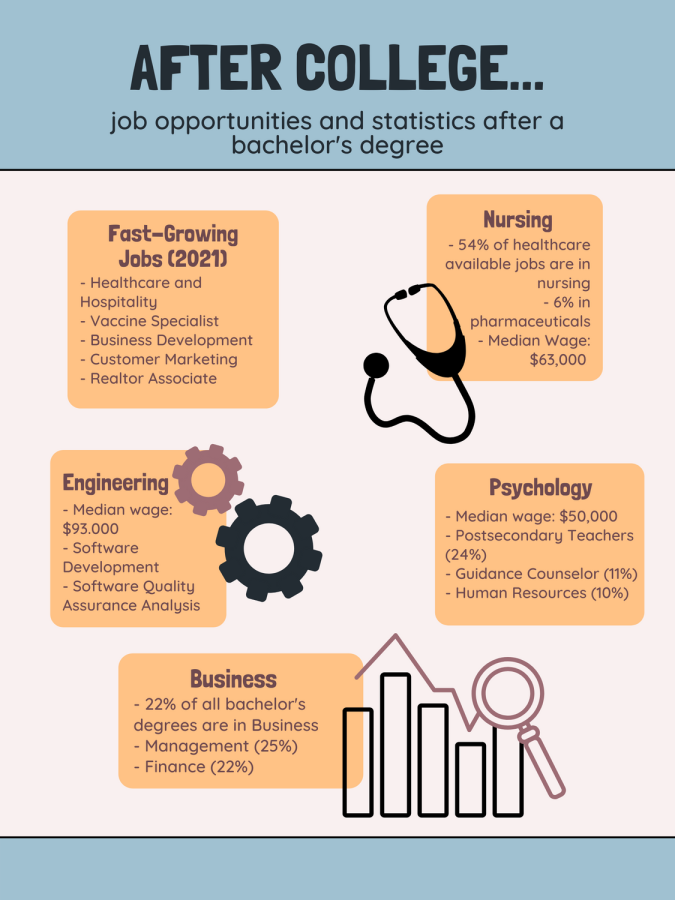Major Decisions to be Made
The process of seniors making their final career choices
May 20, 2022
Every kid spends their childhood dreaming about what they want to be when they grow up. Whether it’s a princess, a firefighter, or doctor, the options are endless. But when it comes to making those dreams a reality, the burden that many high school students feel comes when it’s time to make the decision that will start it all: choosing a college major. Whether the end result is applying “undecided,” or having their 10-year plan already completed, an immense amount of stress, time, and research has gone into that outcome.
Throughout the four years spent in high school, whether we know it or not, we are shaping our own strengths and weaknesses, preparing ourselves for finding out what we want to spend our futures doing. Nana Prange, Central High’s Post-Secondary Counselor, notes how important a wide range of education really is.
“When you consider high school diploma requirements, the purpose is to create a strong foundation in core content areas while intentionally exposing students to a wide variety of curriculum,” Prange said. “Even if students come away knowing they want to pursue a humanities major, or a STEM major, or a fine arts degree, that insight allows them to have a more narrowed focus as they research post-secondary options and make the transition into college.”
One big factor that plays into deciding on a major is how your chosen career path will impact your chance of getting into college. Some larger schools don’t take it into great consideration when viewing applications, but there’s always a chance that it could be what determines your admission.
“If a student is confident about their intended major, then I think it is important for them to declare that within the application,” Prange said. “Some colleges evaluate applications by major and might have a limited capacity for particular programs. In addition, some have scholarship opportunities specifically based on a major. If, however, a student is truly uncertain about what they want to pursue, they should not feel uncomfortable indicating that on their application.”
According to niche.com, Business and Management is the most popular major as of June 2021, with 22% of people in all fields with a Bachelor’s degree graduating with a Business degree. It allows for a vast range of fields to go into after college, and offers a great amount of general information that can be helpful for almost any job. However, according to the Bureau of Labor Statistics, many fields that come from a business major are currently declining in job availability.
Haley Lander (12) will be attending the University of Arkansas in the fall and plans to major in Business Marketing, which is a branch of the top college major of 2021. After taking Marketing classes in high school and being a part of NBHS, Lander is optimistic and excited about her future in business.
“I decided on this major because I’ve always been interested in marketing and advertising as I’ve taken multiple business classes,” Lander said. “I feel like this career could take me in multiple different directions depending on what I’m enjoying learning about.”
Although choosing a major that will get you far in life after college is vital, some of the most important deciding factors aren’t even related to education. Making sure that you’ll enjoy your time in college and feel that you can graduate with real-life experiences is what going to a university is all about.
“My deciding factors were that I wanted to choose a good major that I was interested in as well as know that there’s flexibility in good jobs once I graduate,” Lander said. “I’m most excited to be in a new and fun environment with the opportunity to meet a lot of new people.”
Surprisingly, the third most popular major as of 2021 is also the one with one of the lowest out-of-college employment rates, and that is a Psychology major. The field is expected to grow just 8% in job opportunities from 2020-30. One of the reasons this field is so low after just graduating with a Bachelor’s degree is because most jobs (about 48% according to the Bureau of Labor Statistics) require at least a Master’s or Ph.D. to practice psychology professionally.
Another Bachelor’s degree in the 2021 Top 5 is Engineering. Nawal Said (12) plans to major in Biomedical Engineering at Saint Louis University. While in high school, Said took several courses that helped her come to this decision, including Human Anatomy, AP Physics, and AP Calculus.
“At first, I was solely interested in becoming a physician,” Nawal said. “But, I realized that although I enjoyed health, I was more interested in the technology that is used in the medical field to aid individuals.”
One of Said’s pushes towards deciding on a major was her potential post-graduate salary, which works well in her favor considering that the median salary in an engineering job is $93,000, which is about 68% higher than the average starting salary out of college. Similar to Lander, though, Said knows that one of the most important things to consider is the experience of college and learning how to be successful in the real world.
“I’m looking forward to meeting new people, indulging in the city, and overall just experiencing a new chapter of my life,” Nawal said.
Agreeing with Said and Lander, Timos Stein (12) will be majoring in Animation, which he decided on over the course of his high school career, taking to heart what he was interested in, and what he thinks will take him far in life after college.
“My sophomore year I took an animation class and it clicked that I could do this for a living,” Stein said. “I feel like as far as fine arts go it has a bit more stability. For college, I’m most excited to be surrounded by people with common interests and to learn new things.”
All in all, Prange’s advice for students who are graduating soon, currently deciding on majors, or just now starting to think about college is that the most important thing is knowing yourself well.
“It is important for students to know that it is alright to still be unsure,” Prange said. “When you analyze your strengths, weaknesses and passions, you will hopefully find a connection to a career that is rewarding and enjoyable for many years.”


